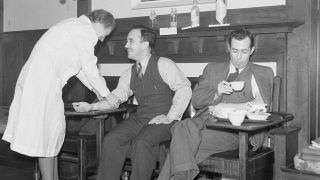
A Cornishman, Richard Lower, conducted the world's first blood transfusion. It took another Cornishman to set up the blood transfusion service.
Percy Lane Oliver was born in St. Ives in 1878 has slipped into relative obscurity since his death in 1944, but his actions will continue to help save the lives of millions of people worldwide as his pioneering blood donation service went from humble beginnings to a global phenomenon.
As a teenager he won a Science and Art Scholarship. He did well in his exams but was rejected by the Medical Board and the aspiring doctor ended up working as an assistant librarian with Camberwell Borough Council in 1893.
In 1901 he was transferred to the Town Hall staff, where he remained until his retirement. In the years leading up to the First World War, Percy was a founder member for the Camberwell Division of the British Red Cross and became its Honorary Secretary in 1910.
During the war, he served in the Royal Naval Air Service, stationed at Crystal Palace, but his contribution to the local war effort was far greater. With the help of his wife, Percy set up and managed four refugee hostels in Camberwell for those fleeing persecution. In 1918 he was summoned to Buckingham Palace to be awarded an OBE by King George V for his charitable work.
But his greatest contribution was yet to come.